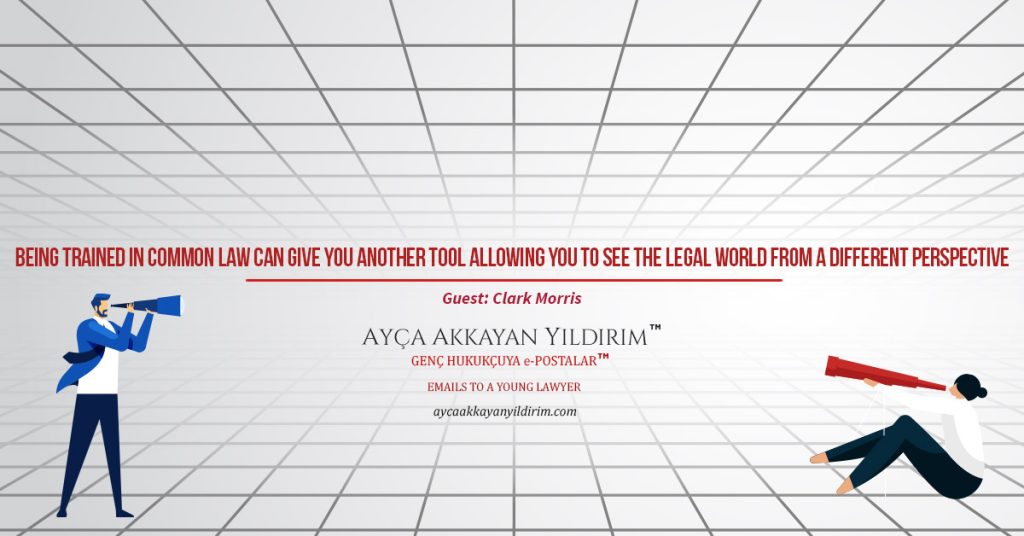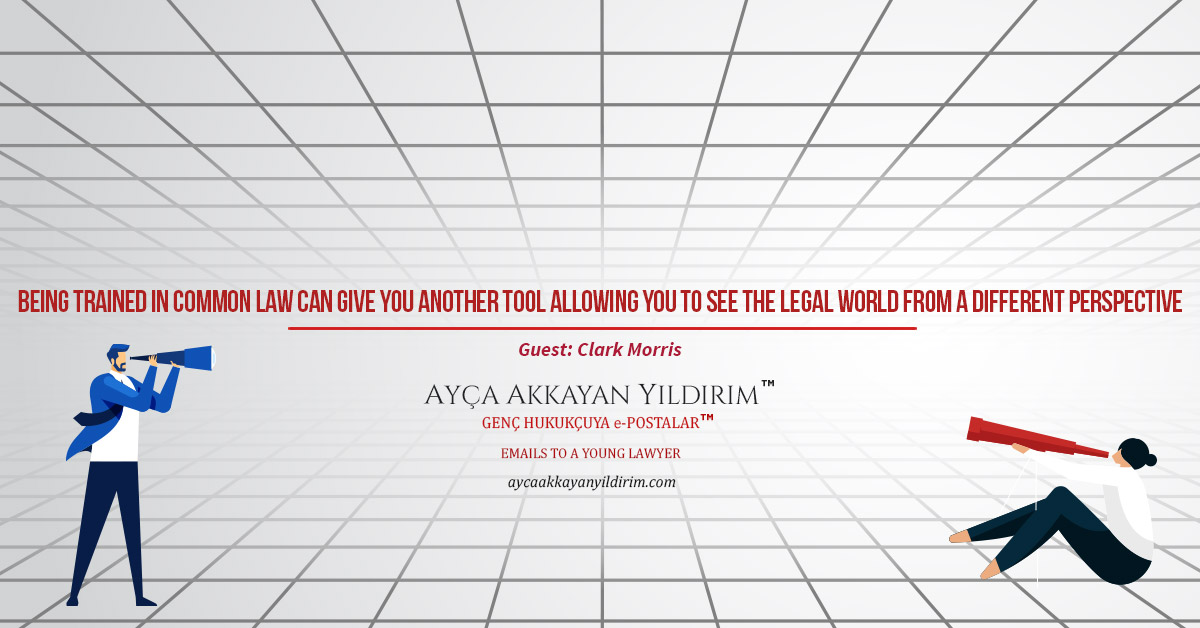Tuesday, October 12, 2021


Date : October 12, 2021
To : Young Lawyers
Re : BEING TRAINED IN COMMON LAW CAN GIVE YOU ANOTHER TOOL ALLOWING YOU TO SEE THE LEGAL WORLD FROM A DIFFERENT PERSPECTIVE
INTERNATIONAL LL.M. PROGRAMS: AMERICAN UNIVERSITY WASHINGTON COLLEGE of LAW, WASHINGTON, DC, USA
Clark Morris, the Director of Graduate Admissions, thank you very much for taking the time to answer my questions regarding pursuing an LL.M. and S.J.D. at Washington College of Law. GHK
GHK: Director Morris, law is increasingly called upon to respond to challenges posed by the global legal environment. In light of this, what do you think is the point of an international LL.M. degree, especially for someone with a civil-law background? Considering that Turkey has a civil law system, what benefits does an LL.M. in the States provide to Turkish law graduates?
CM: While legal systems throughout the world share many similarities, regardless of categorical distinctions like civil-law or common-law, we like to tell students from civil law backgrounds that being trained in the common law gives them another toolbox that allows them to see the legal world from a different perspective. Many of our students find that gaining a common-law education enables them to understand and engage with the legal systems in their countries in different ways. A common law education emphasizes creativity and individualized reasoning of statutory and case law, rather than formulaic application of a legal code. Our students learn that often the best tool is not the memorization of a legal code, but the ability to interpret the law in a way that is helpful to their clients.
GHK: Washington College of Law offers numerous LL.M. programs as well as dual degrees. What do you feel are some of the most robust LL.M. programs within Washington College of Law for a prospective applicant from Turkey who aims to practice in a cross-border setting?
CM: All of our programs at Washington College of Law (WCL) feature flexible curricula that incorporate specialized law courses, seminars and experiential learning experiences. There is not one program that is more robust than the other. Prospective students should select their program based on the area of law that interests them most and our program advisors will assist in developing a curriculum that satisfies the program’s requirements and meets the student’s interests and needs.
GHK: Why should students pursue an international LL.M. degree at Washington College of Law versus any other LL.M. programs in the States? What makes attending Washington College of Law a unique experience?
CM: At WCL, we pride ourselves on the ability to bring individualized attention to our students. Each of our programs has dedicated advisors who provide students the information that they need to be successful. We also provide a career advisor who works exclusively with international students to introduce them to the intricacies of legal hiring in the U.S. market.
GHK: Could you please explain the weight or emphasis given to each part of a student’s application, such as GPA, language score, a personal statement, and letters of recommendation? What are some of the shared characteristics of international LLM applicants who successfully secured a place at Washington College of Law’s LL.M.?
CM: When reviewing an application, the committee spends a lot of time reading the personal statement and the letters of recommendation. The personal statement shows whether the applicant has researched our programs and understands what we have to offer them. We can also assess English fluency through the personal statement. Sometimes it is not easy to glean on the applicant’s character and ethics, and this is where the letters of recommendation are important. They fill the gaps left by the other application items because a recommender will often tell us what it is like to work with that applicant. GPA and language score are important, but we try to contextualize them with the other applications documents. If an applicant tells us that they faced a family hardship during a particular semester, we will be more lenient in how we perceive grades from the time that they experienced the hardship. When it comes to language, we like to tell applicants that we require a certain level of fluency not for us, but for them. By that we mean, generally, the better the English proficiency score the better the student does academically and the easier it is to transition into our legal education system. Student who may struggle tend to be those who rush into applying to an LLM degree when they reach the minimum English proficiency score when they should have been focusing on English language acquisition.
GHK: For prospective applicants from Turkey who take the language test and are unhappy with their original score, would you recommend applying as early as possible anyway, or should they retake the test and apply? May applicants apply for conditional acceptance if they are unable to demonstrate sufficient English proficiency?
CM: We always recommend applying early because it ensures that applicants are well informed about the program and spend abundant time communicating with our office and developing a relationship with their program advisor. That being said, if an applicant is unhappy with their English score, they should let us know when they apply and we can put the application on hold until they have a new score. They would still be able to engage with our office and program advisor while the application is on hold. We do not offer conditional acceptance to applicants who are unable to demonstrate sufficient English proficiency; however, we do offer an LLM Pathway Program. In this program students would spend a semester at the English Language Training Academy within American University, and would gain admission to their chosen LLM program upon successful completion of the Pathway Program.
GHK: What would be a strong example of a recommendation letter? In particular, what do you think about the generalized recommendation letters starting with “To Whom It May Concern” as opposed to the tailored ones?
CM: A strong letter of recommendation tells us how the applicant and the recommender know each other, how much they have worked together or interacted, and provides examples of the applicant’s professional interactions. We often receive recommendation letters from well-known politicians and leaders whose only connection to the applicant is superficial or social, as evidenced by the lack of detail on the interactions the recommended has had with the applicant. That type of letter does not contribute positively to the application because it is not adding any personality. We much prefer letters from supervising attorneys or professors who have spent time getting to know the applicant. When it comes to addressing the letter, letters that start with “To Whom it May Concern” are not a problem. Supervising attorneys and professors are busy people that may not have time to find out exactly who will be reading the letter. Additionally, applications to our programs are evaluated by multiple people, so it is impractical to address recommendation letters to any one individual.
GHK: Could you offer any advice on the best way for an LLM applicant to write a resonant personal statement? Do you have any comments on pitfalls or clichés an applicant should avoid?
CM: Our office has done a series of webinars over the last three years on this topic. There is an overwhelming amount of inaccurate advice available online that needlessly complicates how students should approach writing a personal statement. We have had applicants send 4-5 page long personal statements that fail tell to tell us much about their interests. On the other hand, we’ve received personal statements that are 2-3 paragraphs long and fail to give a glimpse into the applicant’s thoughts and motivation. Our general advice is to write between one and two pages single-spaced, and in that space the applicant should tell us about their academic and professional interests, career goals, and how the program to which they are applying will help them achieve that. The personal statement is not the right place to talk about financial issues or overly personal matters; it should be a reflection of the applicant’s personality and aspirations. If the applicant has a specific aspect of their background, such as a semester in which their grades suffered, we encourage them to include an addendum that addresses this topic.
GHK: Could you please tell us a bit about the merit or need-based scholarships that Washington College of Law School offers? Will the current state of the economy after the COVID-19 pandemic affect the number of scholarships given out? Lastly, does applying for financial aid affect one’s chances of admission?
CM: When reviewing for merit-based scholarships, the admissions committee generally looks at a combination of professional accomplishments and grades. The longer it has been since an applicant graduated, the more emphasis the committee places on professional accomplishments and growth. The pandemic has not affected the number of scholarships given out. We continue to offer a combination of special scholarships, in addition to regular merit-based awards. Some of our special scholarships range up to 100% tuition but they are extremely competitive. Applying for a scholarship does not affect one’s chances for admission.
GHK: Is there career placement assistance for LL.M. students who wish to practice law in the States or their home countries? What should international LL.M. graduates do to increase their recruitment chances after graduation, considering the economy affected by the COVID-19 pandemic?
CM: Our Office of Career and Professional Development (OCPD) offers individualized counseling for LL.M. students throughout their time at WCL. In addition, students receive support from OCPD for one year after graduation. OCPD hosts a number of events on-campus and virtually featuring a range of employers and experts from a variety of practice settings. In terms of advice, I always recommend students to take full advantage of the OCPD resources while you can. Understandably, many students get busy with classes and other things and don’t make time for their career search. The OCPD office can be a huge resource and making it a priority to set aside time every week to focus on professional development and job search is vital to achieving your career goals.
GHK: When I attended the National SJD Roundtable, I met brilliant S.J.D. candidates from Washington College of Law witnessed and the robust nature of the S.J.D. program offered. Given the selective nature of the S.J.D. program, do you have any general advice that you would like to provide to S.J.D. applicants from Turkey before putting together applications to be an S.J.D. candidate at Washington College of Law?
CM: SJD applicants should spend a considerable amount of time working on their application packet, particularly the dissertation proposal. I have seen otherwise qualified applicants fail to secure an offer of admission because their dissertation proposal was poorly put together. Unlike our LLM program, the SJD program only has one intake per year (Fall) and application deadlines are much earlier (Feb. 1) as well.
GHK: Lastly, for the prospective LL.M. applicants from Turkey, could you elaborate on three things you think LL.M. graduates wish they knew when they started the program?
CM: This is a difficult question for me to answer because we only work with candidates during the application process and rarely get to interact with graduates. However, if you are interested in being connected with a WCL graduate, we would be happy to facilitate this connection. We often do this for prospective applicants.
